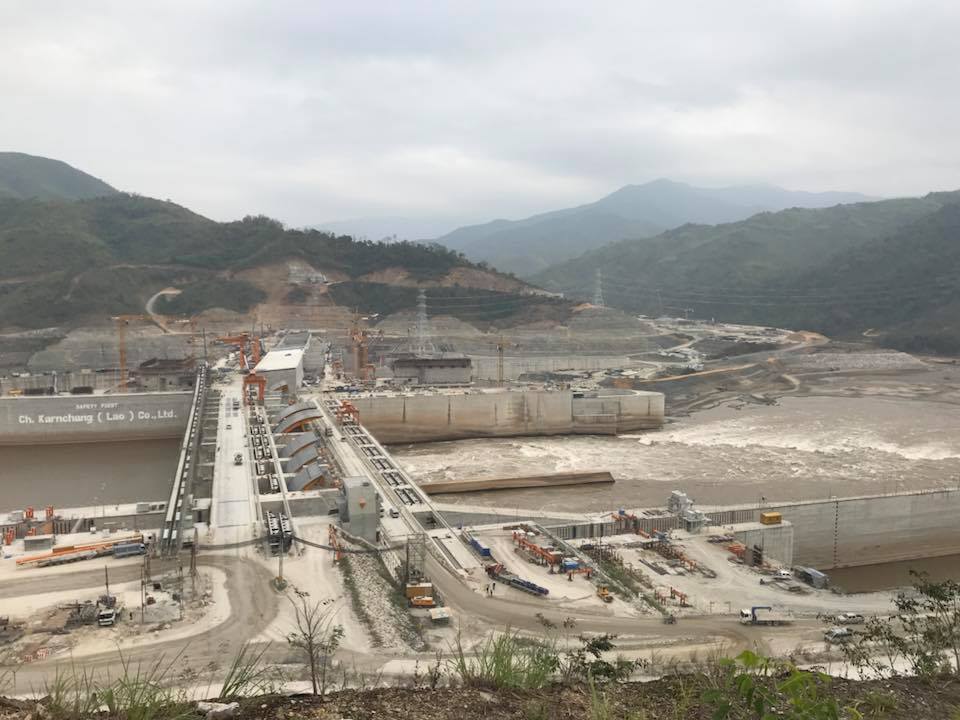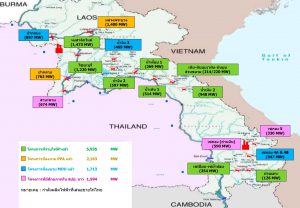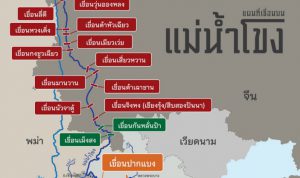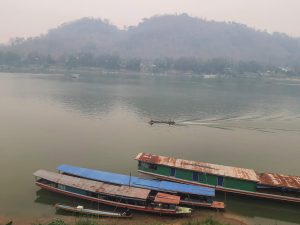On April 1st, the Network of Thai People in Eight Mekong provinces along with other local communities and civil society groups submitted a letter to Thai the Energy Regulatory Commission (ERC), regarding the review of the new Power Development Plan (PDP) for Thailand. The letter is as below.
1 April 2018
Subject: Public participation in the review of the new Power Development Plan (PDP)
Dear Chairperson of the Energy Regulatory Commission (ERC),
The Thai Mekong People’s Network from Eight Provinces and representatives of the civic sector affected by the construction of power plants in Thailand and neighboring countries have been monitoring the developments around the new Power Development Plan (PDP), which will reportedly be concluded in March. The Network has, however, found itself insufficiently informed about the review process for the PDP.
According to the Electricity Generating Authority of Thailand (EGAT)’s website, as of 1 January 2018, Thailand’s installed capacity reached 42,299 megawatts, whereas its 2018 peak load (as per publicly available data) on 21 February 2018 at 19.22 reached 26,351 megawatts. That means our power reserves have reached 15,947 megawatts or 60.5% of the peak demand. In other words, actual power demand is far lower than the forecasted demand. Similarly, during the previous year, in 2016 the excess supply reached over 1,000 megawatts (higher than when the country was beset by the 1997 Financial Crisis). The figure attests to ineffectiveness of the power sector and has led to impacts on people living adjacent to power plants and hydropower dams.
As for this year, according to the Ministry of Energy’s forecast, the peak load will be even lower than the previous year’s; a decrease for the second year in a row. Nevertheless, agencies tipped to hugely benefit from large-scale power plants including EGAT, PTT and Independent Power Producers (IPPs) have indicated that they will continue to push through plans for coal-fired power plants and natural gas power plants, notwithstanding the energy demand reality. Consequently, apart from impacts on the environment and community livelihoods in many areas of the country and in neighboring countries, these projects could incur financial burdens that would be unfairly passed on to power users.
We are the people who stand to bear the environmental and social impacts of the power plants that are under construction or proposed to supply power into Thailand’s grids. This includes the Xayaburi Dam and Pek Beng Dam on the Mekong River, the Thepha-Krabi Coal-fired Power Plants, and Mai Tong Dam and Hatgyi Dam on the Salween River. Under the NCPO government, the Stung Nam hydropower and Koh Kong Power Plant in Cambodia are also being developed for proposed energy sale to Thailand. This would incur unfair financial burdens on consumers and these projects lack transparency.
For example, the Xayaburi Dam project has led to a lawsuit related to transboundary impacts being filed and now pending the review of the Supreme Administrative Court. As its construction is nearly completed, the dam is slated to supply power into Thailand’s grids in 2019, when Thailand continues to face a massive energy glut. The Power Purchase Agreement (PPA) signed by EGAT is made based on a ‘take or pay’ arrangement under which Thailand is to take 4 billion units of power per year, despite having no need for the power supply from this project and the fact that the country will need to pay to bring the excessive power into our grids. This has led to concerns and questions concerning potential conflict of interest on the part of EGAT and PTT, as their subsidiaries are co-investors of the Xayaburi Dam.
The push for Thepha-Krabi Coal-fired Power Plants has also raised questions as to its necessity; since we are facing a massive energy glut, why do we need these two power plants, which will bring about adverse impacts on the coastal ecology. This environment has been an important source of income for the fishing sector and supported community livelihoods through the sustainable use of natural resources. This is without mentioning the invaluable and picturesque beauty of nature, an indispensable foundation for Thailand’s industrial sector.
We assert that the unprecedented level of power reserves poses a major problem and the ERC should treat it as an issue of national concern. This issue must be on the agenda in the process of reviewing and reforming the PDP and ensuring its transparency and fairness to Thai people.
The Network has the following recommendations to enhance the PDP process;
[1] Dismantle EGAT’s Return On Invested Capital (ROIC) and Ft prices calculation subsidies to stem any attempt to inefficiently increase power supply.
[2] Accountability must be put in place in the planning and forecast of power demand by applying contracted demand arrangements with large power users, including large industries and supermalls which warrant the need to keep expanding power supply at the expense of small/household users who consume significantly less power.
[3] Demand-sided Management (DSM) must be seriously addressed in the investment for power procurement. It must be treated as a component of PDP equal to other power supply components and be independent from influence of the race to achieve sale volume which affects annual income of the power utilities.
[4] The PDP must be reviewed to ensure its compatibility with other state policies. More than one comparison plan should be made to explore the best one and to accommodate Integrated Resource Planning (IRP)
Thank you very much.
Yours sincerely,
Signed by
1 Thai Mekong People’s Network from Eight Provinces
2 People’s Network in Northern River Basins
3 Natural Resources and Environment Management Network, Salween Basin
4 Community Network on Natural Resources in Yuan, Ngao, Moei, Salween Basins
5 Salween People’s Network
6 Salween Basin Recovery and Development Association
7 Community Network in the Upper Chem Basin
8 Songkla Citizen Network
9 People’s Network for Monitoring of Satun Development Plan
10 Cha-Na Conservation Network
11. Network of Eastern Friends: Agenda of Eastern Change ‘
12 EEC Watch
13 Civil Society Network in Eight Eastern Provinces
14 Local Fishers Network of Chonburi, Rayong, Chantaburi and Trad
15 Eastern Forest Protection Network
16 Network for 304 Edible
17 Kah Hin Son Coal-Fired Powerplant Impacts Monitoring Network
18 Network for Citizen Council, Chonburi
19 Banglamung Bay Conservation Network, Cetwork
20 Bangpakong Basin Conservation Network
21 Bangkla Protection Network
22 Bo-win Conservation Network, Chon Buri
23 Mather Earth Protection Network
24 Kao Mai-kaew Hills Concervation Network, Prachineburi 25 Phrommanee Conservation Network
26 Nakornnayok City Planning Watch
27 Network Against Waste Powerplant
28 Banbueng Powerplant Affected Communities Network
29 Waste Powerplant Monitoring Network
30 Permatamas
31 Network to Protect Andaman from Coal
32 Network for Citizen in Songkla-Patanni against Coal
33 Community Resource Center
34 Foundation For Natural resources and Environment
35 Community Legal Center
36 Earth Rights Foundation
37 ETOs Watch
38 The Mekong Butterfly




